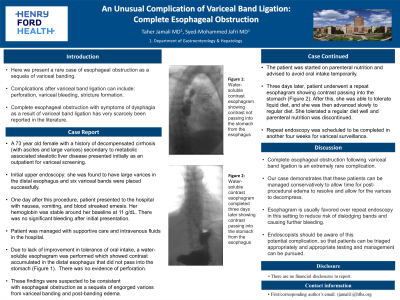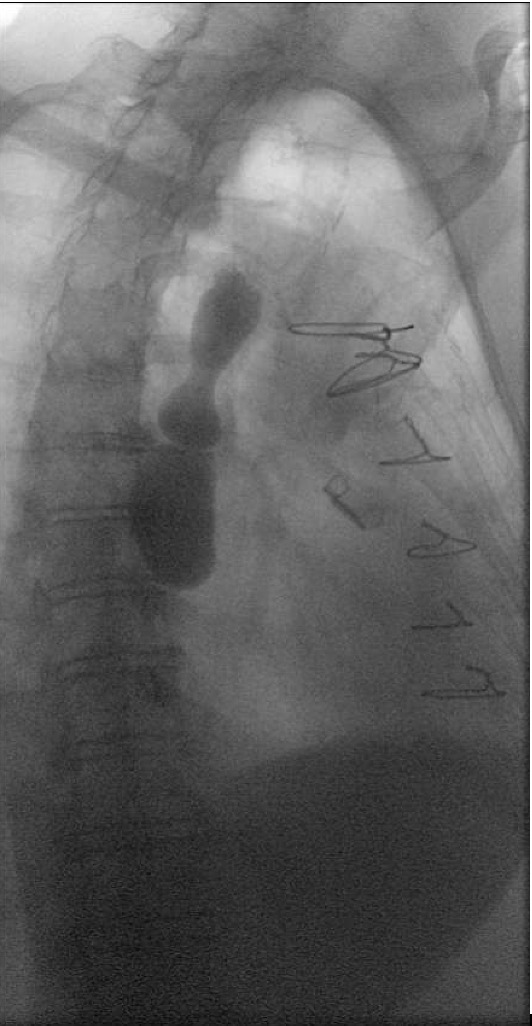Sunday Poster Session
Category: Esophagus
P0609 - An Unsual Complication of Variceal Band Ligation: Complete Esophageal Obstruction
Sunday, October 27, 2024
3:30 PM - 7:00 PM ET
Location: Exhibit Hall E

Has Audio
- TJ
Taher Jamali, MD
Henry Ford Health
Farmington Hills, MI
Presenting Author(s)
Taher Jamali, MD1, Faisal Nimri, MD2, Syed-Mohammed Jafri, MD3
1Henry Ford Health, Farmington Hills, MI; 2Henry Ford Hospital, Detroit, MI; 3Henry Ford Health, Detroit, MI
Introduction: Here we present a rare case of esophageal obstruction as a sequela of variceal banding. Complications after variceal band ligation can include: perforation, variceal bleeding, stricture formation. Complete esophageal obstruction with symptoms of dysphagia as a result of variceal band ligation has very scarcely been reported in the literature.
Case Description/Methods: A 73 year old female with a history of decompensated cirrhosis (with ascites and large varices) secondary to metabolic associated steatotic liver disease presented initially as an outpatient for variceal screening. On upper endoscopy, she was found to have large varices in the distal esophagus and six variceal bands were placed successfully. One day after this procedure, patient presented to the hospital with nausea, vomiting, and blood streaked emesis. Her hemoglobin was stable around her baseline at 11 g/dL. There was no significant bleeding after initial presentation. Patient was managed with supportive care and intravenous fluids in the hospital. Due to lack of improvement in tolerance of oral intake, a water-soluble esophagram was performed which showed contrast accumulated in the distal esophagus that did not pass into the stomach (Figure 1). There was no evidence of perforation. These findings were suspected to be consistent with esophageal obstruction as a sequela of engorged varices from variceal banding and post-banding edema. The patient was started on parenteral nutrition and advised to avoid oral intake temporarily. One week later, patient was able to tolerate liquid diet, and she was then advanced slowly to regular diet. She tolerated a regular diet well and parenteral nutrition was discontinued. Repeat endoscopy was scheduled to be completed in another four weeks for variceal surveillance.
Discussion: Complete esophageal obstruction following variceal band ligation is an extremely rare complication. Our case demonstrates that these patients can be managed conservatively to allow time for post-procedural edema to resolve and allow for the varices to decompress. Esophagram is usually favored over repeat endoscopy in this setting to reduce risk of dislodging bands and causing further bleeding. Endoscopists should be aware of this potential complication, so that patients can be triaged appropriately and appropriate testing and management can be pursued.

Disclosures:
Taher Jamali, MD1, Faisal Nimri, MD2, Syed-Mohammed Jafri, MD3. P0609 - An Unsual Complication of Variceal Band Ligation: Complete Esophageal Obstruction, ACG 2024 Annual Scientific Meeting Abstracts. Philadelphia, PA: American College of Gastroenterology.
1Henry Ford Health, Farmington Hills, MI; 2Henry Ford Hospital, Detroit, MI; 3Henry Ford Health, Detroit, MI
Introduction: Here we present a rare case of esophageal obstruction as a sequela of variceal banding. Complications after variceal band ligation can include: perforation, variceal bleeding, stricture formation. Complete esophageal obstruction with symptoms of dysphagia as a result of variceal band ligation has very scarcely been reported in the literature.
Case Description/Methods: A 73 year old female with a history of decompensated cirrhosis (with ascites and large varices) secondary to metabolic associated steatotic liver disease presented initially as an outpatient for variceal screening. On upper endoscopy, she was found to have large varices in the distal esophagus and six variceal bands were placed successfully. One day after this procedure, patient presented to the hospital with nausea, vomiting, and blood streaked emesis. Her hemoglobin was stable around her baseline at 11 g/dL. There was no significant bleeding after initial presentation. Patient was managed with supportive care and intravenous fluids in the hospital. Due to lack of improvement in tolerance of oral intake, a water-soluble esophagram was performed which showed contrast accumulated in the distal esophagus that did not pass into the stomach (Figure 1). There was no evidence of perforation. These findings were suspected to be consistent with esophageal obstruction as a sequela of engorged varices from variceal banding and post-banding edema. The patient was started on parenteral nutrition and advised to avoid oral intake temporarily. One week later, patient was able to tolerate liquid diet, and she was then advanced slowly to regular diet. She tolerated a regular diet well and parenteral nutrition was discontinued. Repeat endoscopy was scheduled to be completed in another four weeks for variceal surveillance.
Discussion: Complete esophageal obstruction following variceal band ligation is an extremely rare complication. Our case demonstrates that these patients can be managed conservatively to allow time for post-procedural edema to resolve and allow for the varices to decompress. Esophagram is usually favored over repeat endoscopy in this setting to reduce risk of dislodging bands and causing further bleeding. Endoscopists should be aware of this potential complication, so that patients can be triaged appropriately and appropriate testing and management can be pursued.

Figure: Figure 1: Water-soluble contrast esophagram showing contrast not passing into the stomach from the esophagus
Disclosures:
Taher Jamali indicated no relevant financial relationships.
Faisal Nimri indicated no relevant financial relationships.
Syed-Mohammed Jafri: Gilead, Takeda, Abbvie, Intercept, VectivBio – Advisor or Review Panel Member, Speakers Bureau.
Taher Jamali, MD1, Faisal Nimri, MD2, Syed-Mohammed Jafri, MD3. P0609 - An Unsual Complication of Variceal Band Ligation: Complete Esophageal Obstruction, ACG 2024 Annual Scientific Meeting Abstracts. Philadelphia, PA: American College of Gastroenterology.
